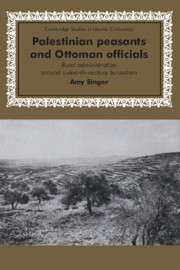Book contents
- Frontmatter
- Contents
- List of maps
- List of tables
- Preface
- Note on transliteration
- Note on money, weights, and measures
- 1 Peasants, Palestine, and the Ottoman Empire
- 2 Aspects of Authority
- 3 The Rules of Local Administration
- 4 Real Accounts and Accounting
- 5 Between Rebellion and Oppression
- 6 Realities and Routines
- Appendices
- Notes
- Bibliography
- Index
6 - Realities and Routines
Published online by Cambridge University Press: 03 May 2011
- Frontmatter
- Contents
- List of maps
- List of tables
- Preface
- Note on transliteration
- Note on money, weights, and measures
- 1 Peasants, Palestine, and the Ottoman Empire
- 2 Aspects of Authority
- 3 The Rules of Local Administration
- 4 Real Accounts and Accounting
- 5 Between Rebellion and Oppression
- 6 Realities and Routines
- Appendices
- Notes
- Bibliography
- Index
Summary
Peasants in Ottoman history have most often stepped from the flat dimensions of the imperial survey registers into the three-dimensional world when they were either the victims of abuse or the villains of insurrection.1 In the past, the key to understanding Ottoman provincial administration was in the prescriptive descriptions of the survey registers with their codifications of local taxes. The ideological underpinnings of administration were construed from the paradigm of the “circle of equity” and the formulae of imperial fermans. Peasants, according to this schema, would enjoy a reasonably secure and regulated existence. Where abuse existed, the system provided a mechanism of redress against greedy or harsh officials. Insistent orders to kadis and governors admonished them: investigate the problem, find the offending parties, punish them appropriately, and do not allow the offense to recur.
Another version of provincial administration cast the Ottomans in the permanent role of corrupt and callous occupation forces. The closing chapters of Ottoman rule in the various provinces have tended to color popular and, sometimes, scholarly perceptions of earlier periods. Social and economic dislocations accompanying the dismemberment and ultimate demise of the empire left a bitter memory in people's minds. Moreover, the legacy of the break-up was a constellation of states whose early independent histories in no way encouraged a sense of gratitude to the former empire. These predominant influences on memory, coupled with a hazy picture of the practical execution of rural administration for the earliest periods of Ottoman rule in the Arab provinces, have contributed to a dull and depressing image of ever over-taxed peasants struggling bravely but in vain against a continually oppressive progression of officials.
- Type
- Chapter
- Information
- Palestinian Peasants and Ottoman OfficialsRural Administration around Sixteenth-Century Jerusalem, pp. 119 - 131Publisher: Cambridge University PressPrint publication year: 1994



